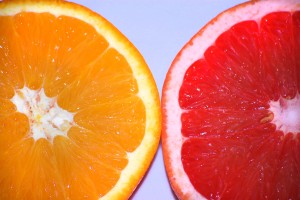
Juicy, tart and tangy, with an underlying sweetness, the grapefruit was named Citrus paradisi in Latin, meaning paradise. First discovered in Barbados, it was a natural cross between the orange and the pomelo.
Highlighting the Nutrients
Low in calories, grapefruits are a good source of phytochemicals, including flavonoids, lycopene, limonenes and glucarates. Grapefruit pectin has also been studied extensively and acts like pectin from other fruits such as apples.
Health Benefits
Pectin is a soluble fibre that has shown to have a cholesterol lowering action. In the studies that demonstrate this 15g of pectin was used to produce a 10% drop in cholesterol, which would amount to around 2 grapefruits a day. Other fruit pectins and soluble fibres would affect us in a similar way.
Grapefruit has also been shown to normalise the percentage of red blood cells in our blood when they are abnormal. This is a measurement called haematocrit, which usually reflect anaemia and also is associated with a higher risk for heart disease. The flavonoid naringin, found in grapefruit, promotes the elimination of old red blood cells from the body. The effect is not seen on people with normal haematocrit levels and this may be an adaptogenic effect.
Lastly, an excellent source of lycopene, this element of grapefruit helps battle heart disease, degeneration of the eyes and cancer. Grapefruit is also rich in D-limonene, inhibiting tumour formation by promoting the production of the detoxifying enzyme glutathione-S-transferase in the liver. This, in turn, sparks a reaction in the liver to help make toxic compounds more water-soluble, meaning they can be excreted from the body.
Don’t forget to eat the pulp! The glucarates in it may help the body get rid of excess oestrogen and therefore may help prevent breast cancer.
Caution
- Some people are allergic to citrus peel, but regardless, it should never be eaten in any significant quantity as the oils may interfere with some body functions ie citral may affect some effects of vitamin A.
- While naringin, as mentioned above, has some benefits, grapefruit shouldn’t be eaten by people on certain drugs. Naringin may inhibit enzymes that metabolise the drugs, leaving higher concentrations in the body leading to toxic side-effects. Please consult your doctor or nutritional therapist if you are on medication, especially with statins, sedatives and immune suppressants.



